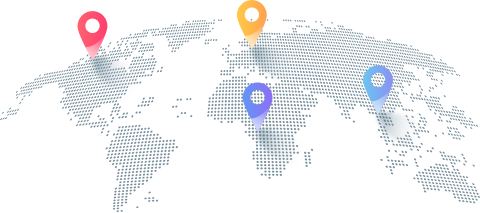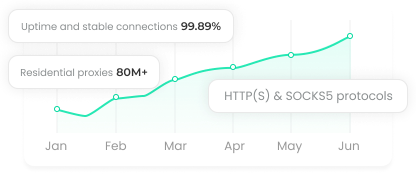
Types of proxies
Type
Shared
Dedicated
Payments
Traffic
Number of IPs
Features
Never expiring traffic
Effortless public data collection
Strengthened online anonymity
Compatible with top third-party software
Bypass IP blocks and geo-restrictions with ease
Exceptional response times
Compatible with top third-party software
Unlimited traffic
Life-time IP renewals
Locations
195+
60+
Protocols
HTTP(S), Socks5
HTTP(S), Socks5
Shared
Traffic
Never expiring traffic
Effortless public data collection
Strengthened online anonymity
Compatible with top third-party software
Bypass IP blocks and geo-restrictions with ease
195+
HTTP(S), Socks5
Dedicated
Number of IPs
Exceptional response times
Compatible with top third-party software
Unlimited traffic
Life-time IP renewals
60+
HTTP(S), Socks5
We accept these payments method:
ABOUT Facebook Proxy
A Facebook proxy serves as an intermediary server that reroutes your internet traffic through a different IP address, ideally located elsewhere. By utilizing a Facebook proxy, you can easily bypass limitations on owning multiple accounts, access content restricted by geography, and enhance your privacy on Facebook.
A proxy server functions similarly to a mail forwarding service. Essentially, a mail forwarding service receives your mail and forwards it to a new address based on your instructions. Likewise, a proxy server receives your request to access Facebook and forwards it to the Facebook server using a new IP address according to your selected settings.
If you wanted to log into any of your Facebook accounts through a proxy server, the connection request handling process would proceed as follows:
Initiating the request: Open your web browser and type “Facebook.com” into the address bar.
Proxy connection: Your device, set up to use a Facebook proxy, sends the connection request to the proxy’s IP address.
Proxy processing: The proxy receives your request and, depending on your configuration, either modifies it or simply passes it along. While the specific changes vary based on the proxy settings, most proxies will at least alter your IP address.
Interaction with Facebook:
Handling: The Facebook server receives the connection request and identifies it as coming from the proxy server’s IP address instead of your own.
Response: After processing the request, the Facebook server sends the response back to the proxy’s IP address.
Receiving the data: The proxy receives Facebook’s response and forwards it to your IP address.
As illustrated, Facebook’s server does not interact with your actual IP address. To Facebook, the request appears to originate from the proxy’s IP, which could be located elsewhere. This is why proxies are effective in helping you bypass network restrictions.
Proxies function by concealing your original IP address, sending your requests through a new one, and making various adjustments to your requests. Below is a summary of the advantages of using proxy-provided IPs for your Facebook accounts:
Bypass Geographic Restrictions
Although Facebook is currently the most widely used social media platform, it is still subject to regional limitations. The app is not accessible in countries like Russia, Iran, Uganda, and North Korea, among others. Additionally, certain organizations, institutions, and government bodies restrict internal network access to Facebook due to specific policies.
A Facebook proxy can swiftly assist you in overcoming these geographical barriers. By masking your IP address and directing your requests through one from a different location, you effectively bypass the restrictions placed on your network. This is why you should choose proxy providers that offer strong location support, as it simplifies the process of finding a Facebook proxy in a region where access to the platform is available.
Enhance Privacy and Security on Facebook
Concealing your IP address is one of the most effective methods to add an extra layer of privacy and security on Facebook. Your regular IP address contains a wealth of information that can be exploited if it falls into the wrong hands. By using a proxy server to mask your IP, you can protect your data from hackers and other malicious individuals, as the digital footprint left by the proxy’s IP is not associated with you.
Access Region-Specific Content
Facebook utilizes your IP address, among other factors, to customize your feed according to your location. Marketers looking to target their campaigns to specific areas often use proxies because they provide a range of IPs from different locations. By aligning a proxy IP with the desired location, marketers can access and leverage region-specific Facebook ads, news, and trends.
Evade IP Bans
Facebook enforces strict rules and regulations for using its platform. If you breach these rules, the app can ban your IP address and prevent you from creating any new accounts. To navigate around these restrictions, consider using a Facebook proxy to hide your IP address and redirect your connection through an alternate server.
Access Facebook Anonymously
Facebook proxies enable users to log into the platform without revealing their identity. Naturally, the level of privacy achieved also depends on the precautions you take, such as using a pseudonymous account. Nonetheless, a Facebook proxy server guarantees that your connection to your device remains private and untraceable.
Easily Scrape Data From Facebook
Companies often scrape data from Facebook to analyze market trends, keep an eye on competitors, and generate leads. However, Facebook strictly forbids scraping and employs various methods to detect and block IP addresses, and in some cases, takes legal action against offenders. For this reason, it is advisable to use rotating proxies when scraping Facebook data. These proxies can alternate between a pool of IPs, simulating access to Facebook from multiple devices in various locations.
Open and Manage Multiple Facebook Accounts
Businesses frequently need to create and manage multiple Facebook accounts to support marketing efforts in different regions. While the app does not specify the exact number of accounts one can create, it employs various detection systems to flag IP addresses that create numerous accounts in rapid succession. Using Facebook proxy servers can help you stay safe. These intermediary servers offer a variety of IPs, which you can assign to different Facebook accounts to reduce the risk of detection.
The advantages of using a Facebook proxy server are extensive. Depending on your specific goals on the platform, concealing your IP address through a proxy server can help you hide your location, simulate multiple Facebook accounts, and even access content that is geographically restricted. The precise benefits you can gain depend on the type of proxy you choose, the provider, and the configuration.
When looking for Facebook proxy addresses, there are three primary types to consider:
Residential Proxies
Residential proxies are highly favored for Facebook applications because they are the most difficult to trace. These proxies emulate IP addresses that are assigned to actual internet users, making them ideal for bypassing Facebook’s advanced detection systems. They are useful for circumventing geographical restrictions on Facebook content, managing multiple accounts, avoiding IP bans, and enhancing your privacy and security on the platform. However, their performance and reliability can be less consistent than other proxies, as they depend on the actual home internet connection from which the IP is derived.
Datacenter Proxies
Datacenter proxies differ significantly from residential proxies in nearly every regard. These IPs are typically sourced from high-speed data centers located around the globe. Because their performance is primarily dictated by these data centers, datacenter proxies generally offer faster and more reliable connections compared to residential IPs. However, this strength also contributes to their main drawback—Facebook’s systems are less likely to trust datacenter IPs since they are not associated with real users. They are best used for Facebook activities that require high speeds and stable connections, such as automated posting and responses on a single account.
Mobile Proxies
Mobile proxies provide IP addresses that are dynamically assigned to mobile devices connecting to the internet through cellular networks like 4G or 5G. These proxy servers effectively mimic the behavior of real mobile users, as they appear to be genuine mobile device connections. While they may be slower than datacenter proxies, modern 4G and 5G bandwidths provide stable and high-speed connections that make mobile proxies advantageous. They are ideal for managing multiple Facebook accounts, verifying mobile ad campaigns, and automating Facebook posting and scheduling.
As discussed previously, there are three primary types of Facebook proxies, each with its own advantages and disadvantages. So, how do you determine which one to choose?
Budget
Datacenter proxies are generally the most cost-effective and easiest to obtain. Residential proxies and mobile servers tend to be pricier because their IPs are linked to actual devices and are part of ISP and mobile cellular networks, respectively.
Anonymity Level
The degree of anonymity on Facebook also relies on the type of proxy you opt for. Mobile and residential proxies provide the highest level of privacy since they offer IP addresses associated with real users. Datacenter IPs are more easily identifiable because they do not belong to actual devices.
Performance and Speed
If your priority is to have proxies that deliver fast speeds and stable connections, datacenter servers are your best option. As mentioned earlier, their performance is contingent upon the data centers from which they are sourced. Additionally, 4G and 5G mobile proxies are also reliable due to the high speeds associated with these network technologies.
Rotation and IP Pool
For social media managers handling multiple Facebook accounts, sticky IPs are preferable, as automatic rotation when accessing a specific Facebook account can raise suspicions. For data scraping and similar automated tasks, dynamically rotating IPs help ensure that the automated traffic remains undetected.
Proxy Provider Reputation
While various factors contribute to a trustworthy proxy provider, strong customer support and a solid reputation are certainly among the most critical. To find customer reviews, check websites like Trustpilot and G2 to see what other users think about a particular proxy provider. Additionally, avoid free Facebook proxies at all costs, as most are either abused, compromised, or simply subpar.
At this stage, you should have a clear understanding of what a Facebook proxy is and how it functions. You can differentiate between the various types of Facebook proxies and select the one that best meets your requirements, whether they be residential, datacenter, or mobile proxies.
As you’ll see below, the process of configuring a Facebook proxy varies depending on your device of choice. Let’s start with Windows users.
How to Set Up Facebook Proxies on Windows
Here is how you can configure a Facebook proxy in your Windows device:
Open your Windows Search bar and key in “Proxy Settings.”
Open the search result labeled “Proxy Settings.”
Select “Manual proxy setup.”
Select “Automatic proxy setup” if you’d like Windows to detect your Facebook proxies automatically.
Enter your proxy’s IP address and port number.
Click “Save.”
If your proxy requires authentication, you will be prompted to enter the username and password before connecting to the internet.
After entering your proxy details, log in to your Facebook app as usual. The proxy you opt for will reroute your Facebook requests through a new IP address.
How to Set Up Facebook Proxies on Mac Devices
Follow the guidelines below to configure Facebook proxies on your Mac device:
Click the Apple icon at the top left corner of your screen.
Open the drop-down menu and select “System Preferences.”
Click “Network” and open “Advanced.”
Open the “Proxies” tab and select the correct IP protocol based on your Facebook proxies.
Enable the “Secure Web Proxy” option and enter your proxy details.
Click “Ok” to save your proxy settings.
As long as the above proxy configuration is active, the proxy server will reroute your requests through a different IP address every time you connect to Facebook.
How to Set Up Facebook Proxies on Android Devices
Here is how you can configure mobile proxies on your Android device:
Open your device settings.
Tap on “Mobile network.”
Open “Access Point Names.”
Tap on the APN you want to change proxy settings for.
Enter your proxy details.
Tap “Save” to save your proxy configuration.
How to Set up Proxies on iOS
How to Set Up Facebook Proxies on iOS
Use the following guidelines to configure mobile proxies for your iPhone Facebook accounts:
Open “Settings.”
Tap on “Wi-Fi” and select your network from the list of available options.
Scroll to the bottom and tap “Configure Proxy.”
Select the “Auto” option if you’d like iOS to automatically detect your Facebook proxies or the “Manual” option to enter your proxy’s IP address and port number.
Be Efficient
Set up your bots to utilize only the minimum amount of data necessary to avoid wasting bandwidth. This is particularly crucial when using IPs that have limited bandwidth.
Be Smart
Familiarize yourself with the various types of Facebook proxies before making a selection. Different servers provide differing levels of performance and anonymity.
Be Safe
Utilize tools for browser fingerprint management, such as Kameleo, to ensure that each Facebook profile appears completely unique.
Frequently asked questions
{{item.title}}

















































